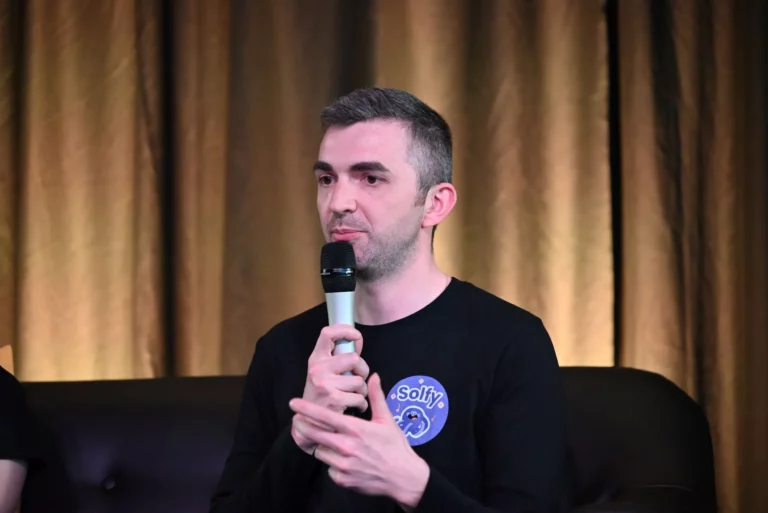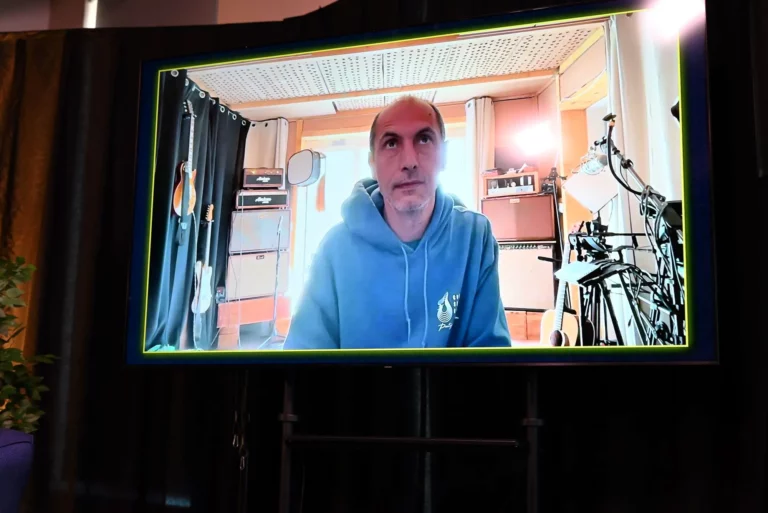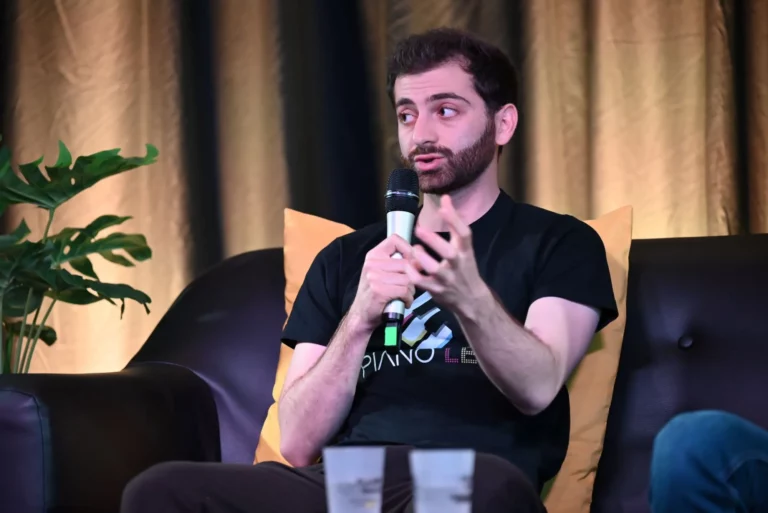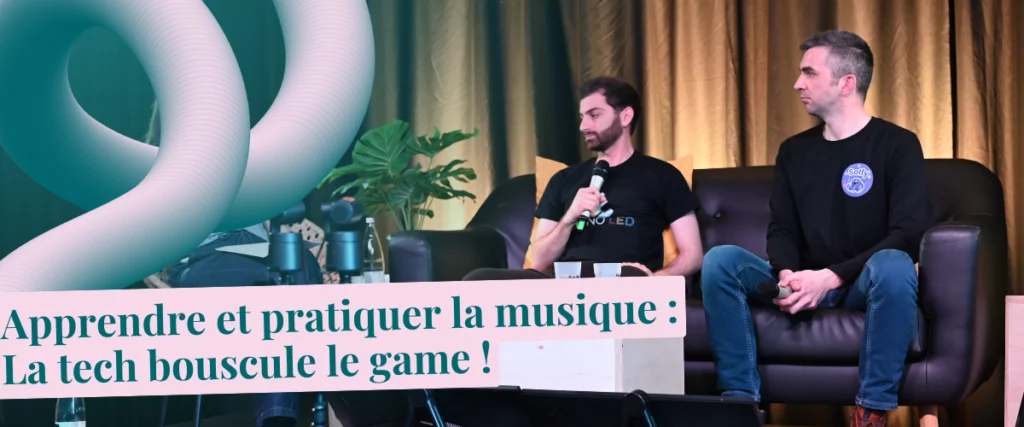Si la pandémie a bouleversé les habitudes, elle a aussi accéléré l’essor d’un secteur en pleine transformation : l’apprentissage musical. Privés de cours en présentiel, élèves comme enseignants se sont tournés vers une pédagogie à la sauce numérique. Cette transition à marche forcée a ouvert la voie à de nouvelles façons d’apprendre, plus interactives et plus personnalisées. C’est dans ce contexte singulier que trois acteurs du domaine ont tiré leur épingle du jeu : Solfy, Piano LED et Guitar Social Club.
Réunis lors d’une table ronde dans le cadre de l’édition 2025 du festival PIX, leurs fondateurs respectifs, Anicet Bart, Anthony Bitard et Yohann Abbou, ont partagé leur vision d’un apprentissage musical en pleine réinvention. Une question centrale a guidé les échanges : comment la technologie peut-elle transformer l’apprentissage musical – notamment via la gamification, sans en trahir l’essence ?
La révolution pédagogique par la technologie
Exit les manuels poussiéreux et les méthodes rébarbatives, place à des outils stimulants ! Chaque solution présentée propose une expérience structurée et hautement gamifiée : chez Guitar Social Club, l’apprentissage de la guitare suit des étapes claires, soutenues par des notifications in-app, adoptant un modèle proche de celui de Duolingo pour l’apprentissage des langues. De son côté, Piano LED mise sur sa bande LED, qui s’adapte au jeu de l’utilisateur, rendant la pratique de l’instrument beaucoup plus intuitive. Quant à Solfy, la plateforme revisite le solfège en s’intégrant aux cours de musique existants, tout en y injectant une dose de ludique : récompenses, objets à collectionner, et même un jeu de cartes des 7 familles.
L’un des points forts de cet échange : la nécessité d’intégrer un système de personnalisation au cœur des dispositifs, en s’appuyant en grande partie sur l’IA. Solfy et Guitar Social Club collaborent d’ailleurs avec les équipes du CNRS pour intégrer de l’intelligence artificielle pédagogique à leur solution.

Dans la pratique, Solfy fournit aux enseignants des analyses synthétiques des progrès des élèves. Piano LED collecte les données de jeu pour ajuster l’expérience utilisateur en temps réel, avec l’objectif d’élargir son offre à la transcription automatisée de vidéos YouTube. Du côté de l’application pour guitaristes en herbe, plus de 4 500 vidéos, analysées selon 27 critères, permettent un apprentissage sur mesure, adapté au niveau et aux difficultés de chacun.
L’engagement utilisateur : clé de la réussite
Au-delà des possibilités de personnalisation et d’interaction, l’enjeu est clair : maintenir la motivation des élèves pour limiter les abandons, fréquents en début d’apprentissage.
Solfy l’a bien compris : l’application de solfège est conçue pour s’intégrer au rituel de la classe, créer un attachement émotionnel via une mascotte et fidéliser les jeunes utilisateurs grâce à une identité forte. Si le contenu ne change pas fondamentalement au fil du temps, des événements ponctuels et une logique de saisonnalité permettent d’animer la communauté. Comme l’explique Anicet Bart, l’objectif est de « récompenser pour maintenir une motivation à court terme face à un objectif qui est très long terme. »

Chez Guitar Social Club, on joue la carte du « phygital » (physique + digital) : masterclass mensuelles, événements en présentiel, échanges au sein de la communauté… Tout est pensé pour faire de cette école de guitare « en ligne » un espace d’apprentissage fondé sur la participation.
Piano LED, quant à lui, mise sur des fonctionnalités d’analyse de performance et sur la dimension sociale de son application. En plus de sa présence sur les réseaux sociaux, celle-ci proposera bientôt le partage d’enregistrements et de tableaux de scores pour encourager les utilisateurs à progresser ensemble.
En somme, loin d’isoler, l’application musicale peut devenir un lieu d’échanges et de partages. Yohann Abbou résume bien cette vision : « Aujourd’hui, le numérique divise et isole, alors que ça peut être vraiment une force de rassemblement. Et cette force de rassemblement, elle est là parce qu’on a un intérêt commun, que ce soit le solfège, le piano ou la guitare. »
Trouver le bon équilibre entre numérique et humain
Loin de mettre les enseignants au chômage, ces outils sont conçus pour compléter leurs cours. Chez Solfy, les professeurs restent au centre du processus, épaulés par des recommandations générées par l’IA. Guitar Social Club et Piano LED reconnaissent aussi les limites du tout-numérique : lorsqu’il s’agit d’improviser ou de peaufiner sa technique, rien ne remplace le regard et l’expérience d’un professeur.

Le festival PIX réunit l'écosystème des ICC
Anicet Bart, Yohann Abbou et Anthony Bitard étaient invités en avril 2025 dans le cadre du festival PIX organisé par la Plaine Images. PIX est né de la volonté de faire briller les acteurs des industries cultuelles et créatives du territoire des Hauts-de-France.
À la fois temps de rencontres entre acteurs de la filière des industries créatives, PIX est aussi une vitrine d’inspiration pour les professionnels « d’ailleurs » voulant s’emparer des bonnes idées, des méthodos, de la créativité et des innovations produites au sein des ICC.
Et ci-dessous, le replay intégral de la conférence :
Et pour retrouver plus de conférences, rendez-vous sur notre chaîne YouTube.
